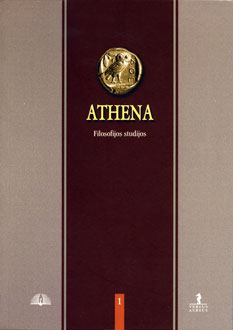Apie ontologines kalbos ribas
The Ontological Boundaries of Language
Author(s): Marija OniščikSubject(s): Philosophy
Published by: Lietuvos kultūros tyrimų
Keywords: boundary; language; ontology; a concept of being.
Summary/Abstract: The article aims at contemplating a somewhat „mystic“ boundary of being in human reality and language. A question is whether one can put a limit on being by defining it in language as a „concept“. The article is reflecting on some considerations of what does it mean to think of „being“ as an existent thing and its “essence”, and what has this meaning to do with a somewhat vague general notion of Being. In presenting different ontological approaches the article strongly suggests that they were developed along the same lines of thought. Beginning with Parmenides and Plato and culminating in Heidegger, one of them constitutes a piece of classical Western ontology, the main concern of which has always been to find a definite „concept of Being“, which for ever remains a mysterious one. The other approach is Aristotelian one, followed by Thomas Aquinas and easily adopted by the philosophy of language of Fregean-Wittgensteinian type. In this case being is never said in language, but it shows itself through the „logical form“ which can be interpreted as a limiting notion whereby the quest for the concept of Being should be considered to be over in our world of logic, if we are not endowed with some kind of divine intuition to peep through the gape or to jump over the abyss. At the same time, there are at least two proposals, offered by the philosophy of language, suggesting how to deal with the so-called „concept“ of being in a logically satisfactory way, these being a Fregean notion of „concept“ and its boundaries, and Wittgensteinian solipsism. At the end of the article both of the solutions are mentioned. It does not amount to saying that there is no an alternative view on the relationship between being and language.
Journal: Athena: filosofijos studijos
- Issue Year: 2006
- Issue No: 1
- Page Range: 164-175
- Page Count: 12
- Language: Lithuanian

